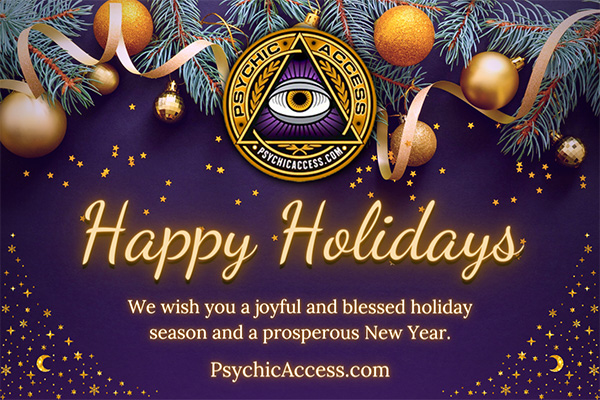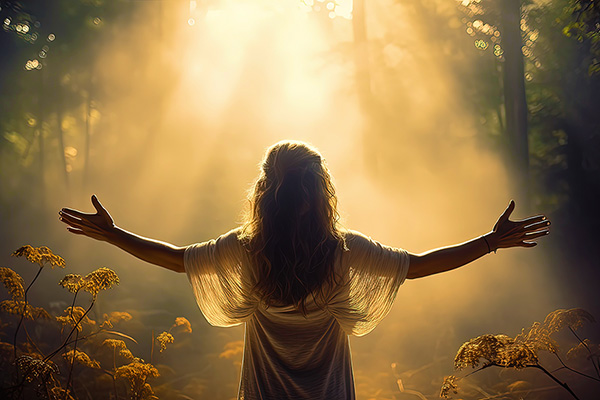divine
Happy Holidays To Our Valued Clients!
 Dear valued clients, as we approach the end of 2023 we want to express our gratitude for your continued support and unwavering trust in our services.
Dear valued clients, as we approach the end of 2023 we want to express our gratitude for your continued support and unwavering trust in our services.
We are grateful for the privilege to be a part of your personal and spiritual journey and look forward to being of service to you for many years to come.
Through the ups and downs of life, we strive to be a constant source of encouragement, hope and healing to help you navigate your daily choices and challenges and manifest your best life. We look forward to continue adding value to your life and to touch many more people’s lives in the future.
We would also like to take a moment to reflect on the profound impact you have had in turn on our journey as a leading provider of psychic services.
Your belief in our mission and your trust in our ability to deliver life-changing results have been instrumental in our growth and success.
We are deeply grateful to all of our loyal clients who support our work. You are the wind beneath our wings and the driving force behind our continued mission to help make the world a better place. We thank you from the bottom of our hearts!
Keep Seeking The Light Beyond The Darkness
 I do a trivia quiz almost every day to keep my mind stimulated and strong. This morning the question was: What is achluophobia? Well, it is the fear of the dark, which is a somewhat reasonable phobia since we instinctively want to be able to see what is going on around us in order to survive. However, as I thought about it more, I realized that we also have the same need to ‘see the light’ on a spiritual level.
I do a trivia quiz almost every day to keep my mind stimulated and strong. This morning the question was: What is achluophobia? Well, it is the fear of the dark, which is a somewhat reasonable phobia since we instinctively want to be able to see what is going on around us in order to survive. However, as I thought about it more, I realized that we also have the same need to ‘see the light’ on a spiritual level.
The darkness of evil, hatred and despair is always out there, lurking in the background, trying to sneak into our hearts and minds and take over. There is a spiritual war going on in our hearts and minds every day.
As we are increasingly drawn into the darkness, we are also increasingly hit with setbacks, hurdles, heartaches, and hardships. Then, in our entitlement and arrogance, we wonder why God, Source, Spirit, the Divine, is not doing anything to help us? Why have we been abandoned? Is there even a higher, divine power that can come to our aid?
It is amazing how many people at one time or another indulge in the thought, the notion that the very God, Source, Spirit, Divine, Universe that guides, protects and provides for us, actually takes the time to also hate, punish or destroy us.
All we have to do is observe the miracle of nature to know that this is not true. Every little miracle of nature, every tree and plant, every stone, every living being has a reason and a purpose to exist in the wonderful mechanics of our planet.
Life Lessons From Spirit That Make Us Stronger
 As we wander through life, we often face many roadblocks, many stumbling blocks and many disappointments. There are many questions that arise as we walk our path and at times it feels like the entire world is against us, as we progress on our journey.
As we wander through life, we often face many roadblocks, many stumbling blocks and many disappointments. There are many questions that arise as we walk our path and at times it feels like the entire world is against us, as we progress on our journey.
Many people blame God, Source, Spirit, the Divine, or other people for the situations they are in, and cannot get past. This simply an illusion that we create in our humanness. Spirit does not want us to fail in life. Spirit does not want us to be unhappy. Spirit does not want us to live a pauper’s life.
It is time to sit down, take a look at all what has happened to you and discover two things about each situation. Why did it happen, and what was the lesson you learned from it? As you look at the examples of pain, suffering or disappointment in your life, what do you see? Were they life lessons from spirit?
For example, you have been with the love of your life for many years. One day your your beloved unexpectedly abandons you for another person. What could you have done to prevent this? What could you have done differently? Why were you not enough? You were in love, totally and unconditionally devoted to this person, and you thought they felt the same way about you. Why did they do this to you?
In almost all cases where this happens, there is nothing you could have done to prevent this. It was not you who walked out of the relationship or marriage; it was your partner. And all people have free will and free choice. This was not your decision to make.
The Modern Practice Of Spiritual Healing
 In a world driven by science and technology, the value of our spiritual health is rarely recognized or appreciated these days, yet it is an essential aspect of our holistic health and well-being.
In a world driven by science and technology, the value of our spiritual health is rarely recognized or appreciated these days, yet it is an essential aspect of our holistic health and well-being.
The truth is that spiritual healing has been practiced since the beginning of time to promote physical, emotional, mental and spiritual well-being. Our ancestors were much wiser in this regard. They had a holistic view of health and wellness that not only focused on the physical and mental, but also honored the spiritual or metaphysical aspects of our existence.
In ancient Egypt, for example, illness was treated as a battle between good and evil, and magical remedies were used in addition to herbal medicines. In ancient Greece, holism underpinned everything, and the soul, mind, and body were considered one.
In Traditional Chinese Medicine, a holistic system practiced for at least 23 centuries, healing is achieved by balancing the yin-yang life force energies that permeate everything in the universe. In the indigenous healing traditions of Native America, holistic health is represented by the four quadrants of the ‘medicine wheel’ or ‘sacred circle,’ namely the physical, emotional, mental, and spiritual states of being.
In Christianity, spiritual healing is documented with many references to the healing power of faith and prayer. The Bible also refers to the spiritual gift of healing, and there are several accounts of Jesus performing miraculous healings. In Hinduism, Ayurveda is a five-thousand-year-old Vedic system of medicine that seeks to restore the balance between the body, mind, and spirit.
From Fictional Self To Authentic Self
 A new concept that seems to be going around a lot lately in the spiritual community is to be your ‘authentic self.’ But what does this really mean? How do you know who your authentic self is? Heck, you may say, “I’m still trying to find out what my life purpose is, never mind who I truly am!”
A new concept that seems to be going around a lot lately in the spiritual community is to be your ‘authentic self.’ But what does this really mean? How do you know who your authentic self is? Heck, you may say, “I’m still trying to find out what my life purpose is, never mind who I truly am!”
Well, as a result of our education, our upbringing, our family dynamics, our job, and such, when we are asked the question “who are you,” we resort to answers such as: a mom, a dad, engineer, doctor, janitor. We tend to express our identity by what work we do, what credentials we have, and what society or our community has told us to be. We are bombarded by social, political, environmental and family expectations that can overwhelm us in modern life.
On top of this, the world today seems to be in chaos. There is distrust everywhere, and we have to contend with challenges like identity theft and social peer pressure. Yet, we are now also expected to know our authentic self? “God, help me, I don’t have time to look for that! I have the kids to take care of, work deadlines to keep, dinner and laundry to do, and I urgently need to sign up for an exercise program to reduce my weight!”
It is never ending, you say. Your authentic self is somewhere, you just don’t know where and no time to find it. But that is just the point! All these things we are expected to do are there because of the pressure we put on ourselves. As we look through our colored lenses of self-inflicted expectations and the social pressure we have learned from family or peers, we lose touch with who we really are, and what we truly want.
The Basics Of Reiki
 Reiki is popular concept in modern spirituality, metaphysics and energy healing. It is therefore good for anyone interested in these fields to have a basic understanding of this technique to engage in discussions with likeminded people in a meaningful way.
Reiki is popular concept in modern spirituality, metaphysics and energy healing. It is therefore good for anyone interested in these fields to have a basic understanding of this technique to engage in discussions with likeminded people in a meaningful way.
The term reiki is a combination of two Japanese words. Rei means ‘divine wisdom’ or ‘divine power,’ and ki means ‘life force energy’ or ‘vital human energy.’ Reiki is therefore a ‘divinely empowered life force.’
Reiki, or rather the system of Reiki, was developed in Japan a century ago by a Buddhist monk known as Mikao Usui. He was a renowned spiritual man who dedicated his life to being of service to others. While seeking spiritual awakening on Mount Kurama, north of the Japanese city of Kyoto, he was divinely inspired with the gift of Reiki. It was introduced to the United States in the late 1930s by Hawayo Hiromi Takata, a Japanese-American woman who received training in Reiki in Tokyo and became a master practitioner.
Although it is more commonly known only as a form of energy healing, true Reiki is in fact a comprehensive spiritual practice and a conscious lifestyle. Yes, it involves the healing of the mind and body, but it also proposes living in total peace with oneself, and being aware of your own unique purpose and spiritual light within. The system of Reiki seeks to remove the layers of fear, worry and attachments that conceal our innate brightness of being.
Let Spirituality Be Your Guiding Light
 In a fast-paced world where superficial, materialistic pursuits tend to dominate our lives, the search for deeper meaning and purpose has become even more significant for many people. Spirituality has always been a guiding light in this quest.
In a fast-paced world where superficial, materialistic pursuits tend to dominate our lives, the search for deeper meaning and purpose has become even more significant for many people. Spirituality has always been a guiding light in this quest.
Spirituality offers solace, clarity, and a profound connection to something greater than ourselves. It is inherently personal and subjective, and not limited to religious affiliations, formal belief systems, or cultural traditions.
To be spiritual is to have a deep awareness of the higher self, as well as a heightened connection to God, Goddess, Source, Spirit, the Divine, the Universe.
Our preferred spiritual practice does not have to be some form of dogmatic religion, which tends to involve organized rituals, ceremony, and fixed doctrines. Instead, it can also be an individual exploration of higher consciousness that seeks a direct and personal experience of the sacred and divine.
Spiritual awareness is also not confined to merely a few isolated moments of contemplation, but instead a holistic, consistent state of mind, or way of being in the world, that permeates every aspect of our life.
By integrating spiritual principles and practices into our daily life, we infuse our everyday choices and actions with intention and authenticity, leading to a more balanced, fulfilling, and purposeful existence.